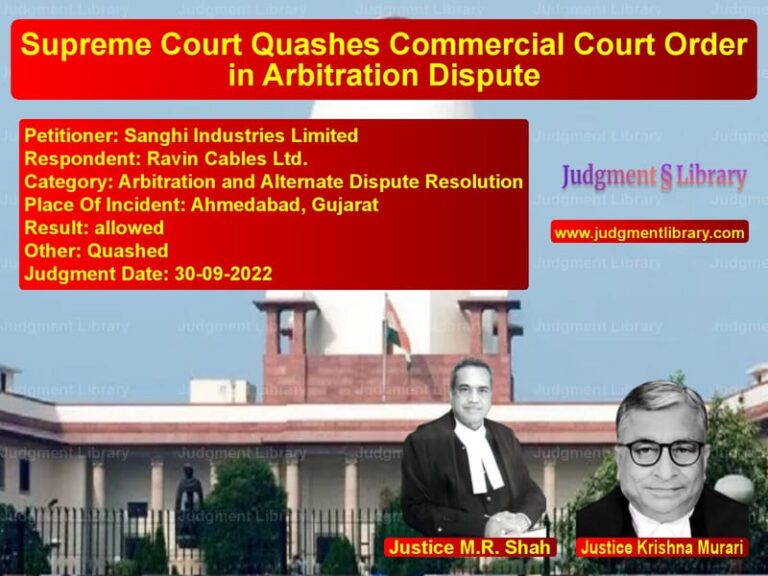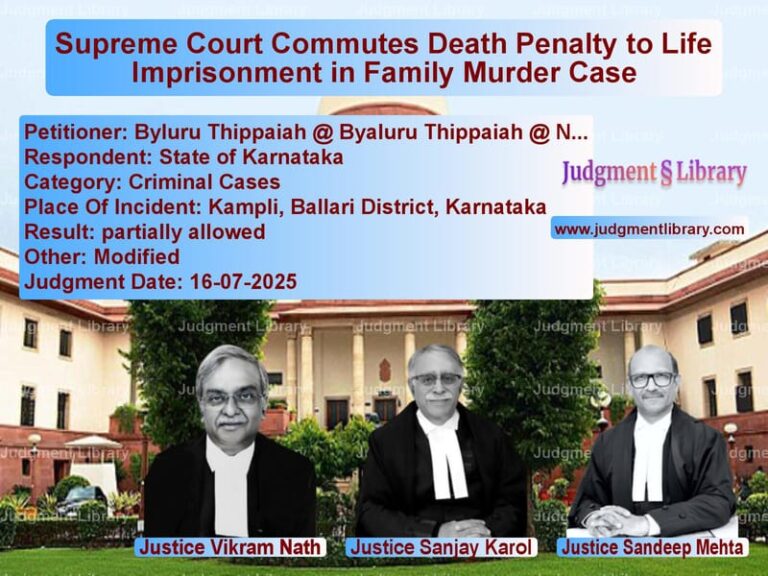Arbitration Award Enforcement: Supreme Court Overturns Stay on Contractor’s Payment
The case of PAM Developments Pvt. Ltd. vs. State of West Bengal revolved around a dispute concerning the execution of an arbitral award granted in favor of the appellant, a contractor, against the State of West Bengal. The Supreme Court had to determine whether an unconditional stay on the award granted by the Calcutta High Court was legally justified under the Arbitration and Conciliation Act, 1996.
The dispute arose from a contract for road repair work awarded to PAM Developments Pvt. Ltd. by the State of West Bengal in 2001. The contractor completed the work in 2002 but was not paid its full dues. After prolonged disputes, the matter was referred to arbitration, resulting in an award of Rs.2,87,11,553/- with 18% annual interest. The State of West Bengal challenged this award under Section 34 of the Arbitration Act before the Calcutta High Court, which subsequently granted an unconditional stay, preventing the contractor from enforcing the award.
Arguments of the Petitioner
The appellant, represented by their legal counsel, contended:
“The grant of an unconditional stay without any security deposit violates the intent of the Arbitration and Conciliation Act, 1996, which aims to provide timely enforcement of awards.”
The petitioners further argued:
- The Arbitration Act does not provide any special exemption for government entities regarding enforcement of awards.
- Under the amended Section 36(3), a stay on the enforcement of an arbitral award should be subject to conditions, including requiring the judgment debtor to deposit the awarded amount.
- The Calcutta High Court erred in granting an unconditional stay by relying on Order XXVII Rule 8A of the Code of Civil Procedure (CPC), which exempts government entities from furnishing security in civil suits.
- The government should not be treated differently from private litigants in arbitration proceedings.
Arguments of the Respondent
The State of West Bengal, represented by legal counsel, opposed the execution of the award, arguing:
“The government, being a public authority, should not be compelled to deposit large sums of money upfront, as it could affect its financial administration.”
The respondent further contended:
- Order XXVII Rule 8A of the CPC provides that government entities are not required to furnish security when seeking a stay of execution.
- The execution of an award against the government should be subject to additional safeguards to prevent disruption of public funds.
- The arbitration proceedings and the award were flawed, and the government had strong grounds for challenging it under Section 34.
Supreme Court’s Verdict
The Supreme Court, with Justices R.F. Nariman and Vineet Saran presiding, ruled in favor of the appellant, overturning the High Court’s decision and restoring the contractor’s right to enforce the award. The Court observed:
“The amended Section 36(3) of the Arbitration Act mandates that a stay on the enforcement of an arbitral award should be subject to conditions, including the deposit of the awarded amount. The High Court’s decision to grant an unconditional stay by relying on Order XXVII Rule 8A CPC is legally unsustainable.”
The Court ruled:
- The Arbitration Act is a self-contained code, and reliance on CPC provisions like Order XXVII Rule 8A is misplaced in arbitration matters.
- Government entities should not receive special treatment in arbitration enforcement cases.
- The execution of an arbitral award cannot be stayed unconditionally; conditions such as deposit of part or full award amount should be imposed.
- The High Court’s order was set aside, and the appellant was allowed to seek enforcement of the award.
Key Takeaways from the Judgment
- Arbitration awards must be enforced promptly, and government entities cannot use procedural protections to delay payments.
- The grant of a stay in arbitration matters should be subject to conditions to ensure fairness for both parties.
- Order XXVII Rule 8A CPC, which exempts government entities from furnishing security, does not override the Arbitration Act’s provisions.
- This ruling reinforces that public sector entities must honor arbitration awards and cannot misuse legal provisions to delay execution.
This decision is a significant step toward ensuring fairness in arbitration enforcement and preventing delays in payments due to contractors and private entities dealing with government contracts.
Petitioner Name: PAM Developments Pvt. Ltd..Respondent Name: State of West Bengal.Judgment By: Justice R.F. Nariman, Justice Vineet Saran.Place Of Incident: West Bengal.Judgment Date: 12-07-2019.
Don’t miss out on the full details! Download the complete judgment in PDF format below and gain valuable insights instantly!
Download Judgment: PAM Developments Pvt vs State of West Bengal Supreme Court of India Judgment Dated 12-07-2019.pdf
Direct Downlaod Judgment: Direct downlaod this Judgment
See all petitions in Arbitration Act
See all petitions in Enforcement of Awards
See all petitions in Dispute Resolution Mechanisms
See all petitions in Judgment by Rohinton Fali Nariman
See all petitions in Judgment by Vineet Saran
See all petitions in allowed
See all petitions in supreme court of India judgments July 2019
See all petitions in 2019 judgments
See all posts in Arbitration and Alternate Dispute Resolution Category
See all allowed petitions in Arbitration and Alternate Dispute Resolution Category
See all Dismissed petitions in Arbitration and Alternate Dispute Resolution Category
See all partially allowed petitions in Arbitration and Alternate Dispute Resolution Category







